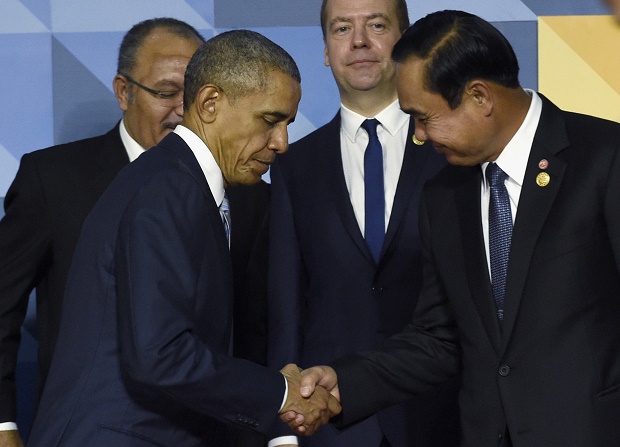Obama to push trade agenda at summit with Southeast Asia

In this Nov. 19, 2015 file photo, President Barack Obama shakes hands with Thailand’s Prime Minister Prayuth Chan-ocha in Manila, Philippines. When President Barack Obama welcomes Southeast Asian leaders for a shirt-sleeves summit in California this week, he’ll have some interesting dining companions. There will be a coup leader with a penchant for song, a sultan with a taste for the high life and a ruthless prime minister with 31 years on the job. AP FILE PHOTO
MANILA, Philippines — A summit next week between Southeast Asian leaders and President Barack Obama is unlikely to deliver any big economic prizes, but will allow the American side to press the advantages of joining a Pacific trade pact that doesn’t include China.
The meetings at Rancho Mirage in California set for Monday and Tuesday will be the first summit of its kind for the 10-member Association of Southeast Asian Nations on US soil. Its special nature is intended to show the Obama administration’s commitment to countering growing Chinese influence in a region that is home to 620 million people and a $2.6 trillion economy.
Southeast Asian nations have benefited from increased trade and investment stemming from their giant neighbor’s economic rise but many are wary of China achieving overweening influence. The US, meanwhile, has an interest in maintaining freedom of navigation in the South China Sea, a crucial global trade route.
READ: US to expand war drills in S. China Sea
The summit is meant to send a signal that the US values ASEAN, said US Deputy National Security Advisor Ben Rhodes, using the acronym for the Southeast Asian grouping. “We are going to be engaged in Southeast Asia, we’re going to be engaged in working with the nations of the Asia Pacific to clear rules of the road on the various issues of common interest that we share with them,” he said.
The Southeast Asian nations of Brunei, Malaysia, Singapore and Vietnam are already part of the US-led Trans Pacific Partnership trade pact that is awaiting ratification by national parliaments. The agreement eliminates many tariffs and also imposes minimum labor standards on member nations as part of US efforts to set rules for trade and business in the region and beyond.
READ: Asean may displace China as economic hub
Indonesia, which is the largest economy in Southeast Asia, along with Thailand and the Philippines are prospective members of the pact, which took several years to negotiate and was a main plank in Obama’s drive for a deeper relationship with Asia.
Cambodia, Laos and Myanmar, which are the least developed countries in Southeast Asia, aren’t eligible to join because they aren’t members of the Asia Pacific Economic Cooperation grouping.
Richard Javad Heydarian, assistant professor of political science at Manila’s De La Salle University, said he expects Obama to pitch the benefits of American-led economic initiatives, and particularly for Southeast Asia’s economic heavyweights, Indonesia and Thailand, to join the Pacific trade agreement.
He also expects Obama to court Cambodia, Laos and Myanmar as countries that are within the economic orbit of China.
“What the US can do, what Obama can do, is encourage these countries to be less dependent on China so that they have more options when it comes to their foreign policy, when it comes to how they govern themselves,” he said.
A new US initiative called ASEAN Connect aims to set up US government regional offices in Jakarta, Bangkok and Singapore to help Southeast Asia on infrastructure projects, and support development by helping poorer countries such as Laos, Myanmar and Cambodia to improve customs services, develop investment regulations and the rule of law.
Philippine Finance Secretary Cesar Purisima said expanded economic ties could “form the building blocks of a potential trade agreement and perhaps prepare the region in joining the TPP.”
Alexander Feldman, president and CEO of the Washington-based US-ASEAN Business Council representing American businesses in Southeast Asia, said the addition of Indonesia, Thailand and the Philippines would be a substantial boost to the Trans Pacific Partnership.
But there are challenges to overcome for each country. The Philippines, for example, needs to amend foreign ownership restrictions in its constitution, a highly contentious move in the rambunctious democracy of more than 100 million people.
Feldman, a former Assistant Secretary of State, does not expect a lot of concrete outcomes from the summit. But he said it will set the stage for successful US-ASEAN and East Asia summits in Laos in September, and continued close ties after Obama bows out of office next year.